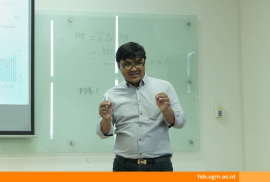A data-driven approach and mathematical algorithms can help to address various challenges in modern accounting, particularly those related to inconsistencies in financial reporting. This was conveyed by Prof. Dr. Sony Warsono, MAFIS., Ak., CA., a lecturer at the Department of Accounting, Faculty of Economics and Business (FEB) UGM, during the “Accounting and Mathematics” webinar, organized by Center for Accounting Studies (PKAP) FEB UGM on December 12.
Sony emphasized the importance of consistent variables in financial statements to achieve transparency and accuracy. He illustrated this with an example of the hereditary distribution of cows to show how mathematical logic can be applied to rule-based decision-making.
The webinar also featured Dr. Gunardi, M.Si., a lecturer at the Department of Mathematics, FMIPA UGM, who presented a topic entitled “State of the Art Implementation of Mathematics in Accounting”. Gunardi explained various applications of mathematics in modern accounting. He discussed statistics, stochastic processes, and actuarial science, which contribute significantly to financial analysis, budget management, and risk management. For example, regression analysis in statistics can predict economic trends, while stochastic models are used to value assets such as stock options. He also highlighted the importance of mathematics in calculating interest, depreciation, and amortization to produce accurate and relevant financial information.
Meanwhile, Muhammad Sardjono Hadidjaja, S.E., Ak., an observer of mathematical accounting, discussed the possibilities and evidence of mathematical applications in accounting. He explained the True Global Financial Statement approach, which integrates Islamic value principles with mathematical logic to create a unified and value-based accounting system. This concept solves the inconsistencies in traditional financial statements, which often mix market value, historical cost, and future projections inconsistently.
Prof. Dr. Tjiptohadi Sawarjuwono, M.Ec., Ak., a professor at the Faculty of Economics and Business – Universitas Airlangga, explained the relationship between mathematics and accounting, touching on fundamental principles such as probability and uncertainty. He also discussed how accounting addresses the challenges of recording future transactions based on clarity and responsibility derived from religious values. For example, he cited a zakat-based commerce approach requiring consistent variables to calculate obligations accurately. For instance, cash balances are calculated based on nominal values, while inventories are valued at lower cost or market.
Reportase: Orie Priscylla Mapeda Lumalan
Editor: Kurnia Ekaptiningrum
Sustainable Development Goals







